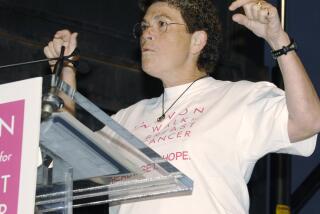Less Invasive Cancer Treatment Called For
- Share via
As you correctly reported, neither cancer nor its treatment necessitate the end of a satisfying sex life (“Sex After Cancer,” Aug. 14). Two points, however, deserve amplification.
For the majority of women, breast preserving surgery (lumpectomy) and radiotherapy have been shown to be equal to radical mastectomy with regard to cancer control and better than radical mastectomy with regard to a woman’s self-esteem and sexuality. Yet breast conservation remains underutilized with widely varying rates throughout the country--suggesting that physician / institutional bias leads to the unnecessary loss of women’s breasts. Patient and physician education continue to be badly needed.
For men with prostate cancer the radical prostatectomy often leads to impotence and incontinence. Less invasive options, such as external radiation therapy or radioactive implants, appear to be equally effective with far fewer sexual losses. However, good research measuring the outcome of our various techniques is appallingly scarce. Thus, the majority of urologists favor a surgical approach while the majority of radiation oncologists would recommend a less mutilating approach. Patients remain caught in the knowledge gap.
What we need are better studies and more frank discussion with patients about how little we know rather than how much.
ROBERT C. WOLLMAN, M.D.
Valley Radiotherapy Associates
Tarzana
*
I read with interest Kathleen Ryan’s article “Sex After Cancer.” Few people understand the importance of the period following surgery or medical treatment for cancer. As the article describes, patients experience a variety of emotions, along with physical and mental pain. The support of loving friends and family can be critical during the healing time.
The John Wayne Cancer Institute established a Positive Appearance Center to help patients deal with the comfort needs and cosmetic side effects related to their disease and its treatment. The center provides wigs, hats, breast prostheses, swimsuits and other cosmetic items, as well as individual counseling and support groups and seminars.
ARMANDO E. GIULIANO, M.D., Director
Joyce Eisenberg Keefer Breast Center
John Wayne Cancer Institute






